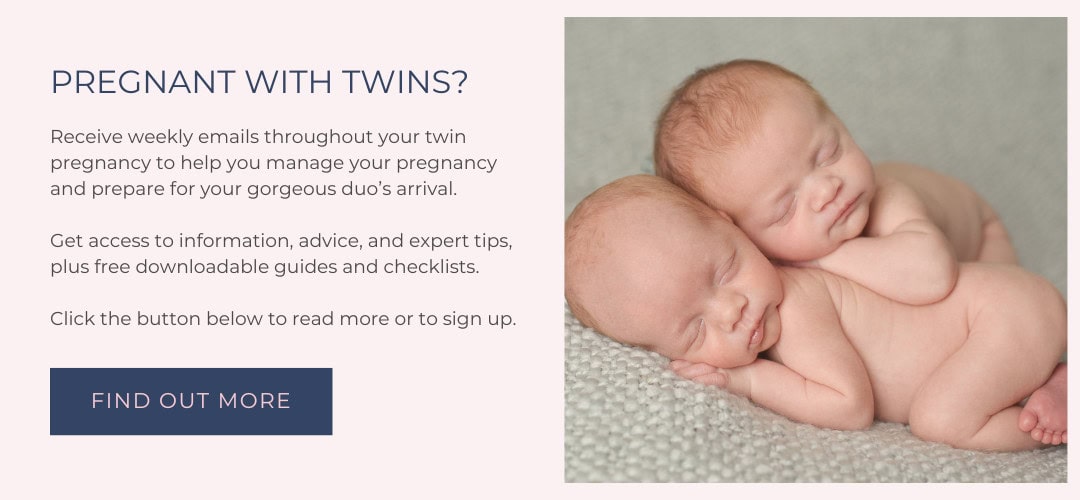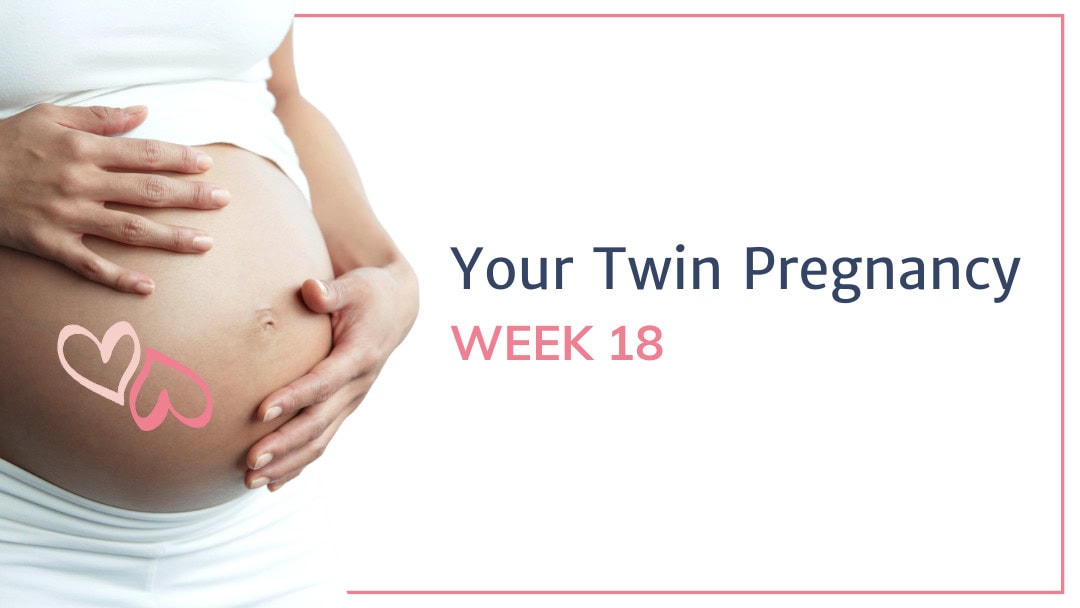Welcome to week 18, mama! You’re nearly halfway there, especially if you are having identical twins.
You might be noticing your twins moving around a lot more now, especially at night when you’re trying to catch some rest. While their kicks and wiggles are a sweet reminder of the little lives growing inside you, it’s also normal to start thinking ahead to how life will be after their arrival—especially when it comes to sleep.
Sleep is a huge topic when you’re expecting twins, and for good reason! Having two babies at once brings unique challenges, especially when it comes to those precious hours of rest (for both you and them).
This week, we’re going to focus on your newborn twins’ sleep, covering some important considerations and tips to prepare you for when your little ones arrive.

How are you feeling mama?
Twin Pregnancy Symptoms at 18 weeks
At 18 weeks, you’re likely feeling your babies move more often, and that can be both exciting and a bit tiring.
As your belly grows, sleep may not come as easily as it once did, especially if you’re dealing with heartburn or struggling to find a comfortable sleeping position.
Now’s a good time to start exploring sleep solutions for yourself—because as you prepare for those first few weeks with newborns, getting enough rest during pregnancy is crucial.
Here are a few tips to help you sleep better:
Prop yourself up: Heartburn is common, so try sleeping propped up with extra pillows to ease the discomfort.
Sleep on your side: By now, sleeping on your back might be uncomfortable. Opt for your left side, which helps with circulation. Remember that adding a small pillow between your knees will help keep your hips more aligned and prevent any pressure points that could cause more pain.
Stay hydrated—but manage nighttime trips to the bathroom by cutting back on liquids right before bed.
Taking care of yourself now will help you better prepare to tackle the sleepless nights ahead with your twins.
What are your twins up to this week?
Your Twins at 18 Weeks – Height & Weight
At 18 weeks, your twins are each about the size of bell peppers, measuring around 5.5 inches (14 cm) from crown to rump and weighing roughly 7 ounces (200 grams).
While they’re still small, their bodies are becoming more proportionate, and their growth is starting to become more individualized. Fraternal twins may already be showing size differences, whereas identical twins might remain closer in size since they share the same genetic blueprint.
It’s amazing to think that soon, you’ll be holding two little humans in your arms!
Your Twins Fetal Development at 8 weeks
You’ve probably started feeling those first little kicks and flutters by now, and they’re only going to get stronger as the weeks progress! At 18 weeks, your twins’ muscles and bones are developing rapidly, which allows them to become more coordinated with their movements. Their arms and legs are now in proportion to the rest of their bodies, making their kicks more defined – not great if those kicks are directed at your ribs or bladder!
These movements are not just random bursts of energy—your babies are actually practicing important skills like stretching, kicking, rolling, and even grasping. They may even be playing with the umbilical cord or touching their faces.
Sleep Patterns in the Womb
Though your twins’ sleep patterns aren’t fully developed yet, they’re starting to establish more distinct cycles of activity and rest. These cycles can last anywhere from 20 to 40 minutes, and during periods of rest, your babies are likely experiencing early forms of sleep.
By week 18, they’re likely alternating between periods of quiet rest and active wakefulness, much like newborns will do once they arrive. These mini sleep-wake cycles might not sync up yet—one twin could be resting while the other is doing somersaults! Interestingly, they’re also beginning to show signs of Rapid Eye Movement (REM) sleep, a critical phase of sleep that will play an essential role in their brain development and cognitive functions as they grow.
Nervous System Development
One of the most exciting developments happening this week is in your babies’ nervous systems. Their brains are making huge strides, particularly in the area of sensory development. The nerves connecting the brain to the rest of their bodies are becoming more sophisticated, allowing them to respond to stimuli more effectively.
While they won’t be able to see yet because their eyelids are still fused shut, their senses of touch, taste, and hearing are beginning to sharpen.
Lungs and Breathing Practice
Though they won’t take their first breaths of air until after birth, your twins are already practicing breathing movements. At this stage, their lungs are developing, and they are beginning to take small amounts of amniotic fluid into their lungs and then expelling it, mimicking the breathing they’ll do after birth. This practice is crucial for lung development, ensuring that their respiratory systems are strong and ready for when they finally take their first breaths of fresh air.
Facial Features and Sensory Development
Their facial features are becoming more refined this week, too. Their ears are in their final position, and their eyes—though still closed—are facing forward. The tiny muscles around their faces are getting a workout as they begin making small expressions like frowns or yawns.
Your twins’ hearing is also improving. By week 18, they can start picking up on muffled sounds from the outside world, including the sound of your voice! Even though it might not be crystal clear, they’re starting to recognize your tone and the rhythmic sound of your heartbeat. Talking to them, playing music, or simply rubbing your belly can create a bonding experience and stimulate their senses.

What You Might Be Wondering About This Week
Sleep Options for Twins: Co-Bedding vs. Separate Sleep Spaces
Well before your twins arrive you will want to have a good idea about where your twins will sleep, for both their daytime naps and most importantly at night to make night feeds as quick and fuss free as possible so everyone can get back to sleep.
So, should twins share a crib, or each have their own space?
The American Academy of Pediatrics (AAP) recommends that babies sleep in the parents room, on a firm mattress in their own safe sleep space, this is to minimise the risk of sleep related infant death.
Many parents of twins choose to co-bed, especially in the early weeks, as it can save space and offer comfort to your babies. They’ve spent all this time growing side by side, so sleeping together can be soothing for them.
For some parents, opting for separate cribs from the start works best, particularly if their twins have very different sleep needs or patterns. Mini cribs or bassinets can be a great space-saving solution while still giving each baby their own safe spot.
Having portable bassinets can also be a great option for daytime naps as you can move them around the house depending on what you are doing.
What is Co-Bedding Twins and What Are the Risks?
Co-bedding twins refers to the practice of placing both babies in the same crib or bassinet to sleep. Many parents choose this option, especially in the early weeks, as it can be comforting for twins who are used to being close in the womb. Co-bedding may also make nighttime care easier, as both babies are in the same space.
However, it’s important to be aware of the potential risks.
Co-bedding can increase the chance of overheating, or for a hungry baby to latch on to their bed buddies nose. They are also more at risk of loose blankets covering faces and potentially restricting airways if there are two of them in the same space. All of which are risk factors for SIDS.
If you decide to sleep them together then to minimize these risks, ALWAYS follow safe sleep practices, such as using a firm mattress, avoid any loose bedding, and placing babies on their backs to sleep.
READ MORE: Practical and safe sleeping options for newborn twins
Bedding Options for Twins
With twins on the way, figuring out the right bedding is key. Whether you opt for a single crib or two, make sure you choose a firm mattress and snug-fitting crib sheets.
Skip the bumpers, pillows, toys, and blankets, as they pose safety risks. You might also consider using a swaddle or sleep sack to help your babies feel cozy and secure.
Preparing for Help: Night Nannies, Family Support, and Self-Care
Caring for two newborns is a full-time job—and then some! Sleep deprivation is inevitable, but having help can make all the difference. Many twin moms consider hiring a night nanny or relying on family support to give them some rest during those first exhausting weeks.
If hiring a night nanny isn’t on the cards, talk to family members or close friends about how they can help with night feedings or taking shifts to let you sleep.
And don’t forget to prioritize self-care—taking a nap during the day or asking for help is not selfish, it’s necessary!
What the First Few Weeks Will Really Look Like
It’s no secret that sleep is scarce with newborns. In the first few weeks, your twins will likely wake up every 2-3 hours for feedings, especially if you are breastfeeding.
And remember this is day and night.
Their sleep cycles are short, and their little tummies need regular feeding, so it’s normal for them to be up often.
Having them sleeping in your room at night and setting yourself with a routine so both you and your partner know what needs to happen for a smooth diaper change / feed / burp / cuddle and back to bed routine will really help to maximise the small windows of sleep you can snatch in those early days.
While it may seem daunting, try to remember that this phase won’t last forever.
READ MORE: Your Newborn Twins – Sleep
Monitoring Your Babies’ Sleep
Many twin parents find comfort in using a baby monitor, especially if your twins arrive early as their little lungs may need a bit longer to grow strong and so will require monitoring more closely for a few weeks.
Sleep monitors such as the Owlet Smart Sock is a popular choice, as it monitors your babies’ oxygen levels and heart rate while they sleep. There is nothing like that added sense of security to make sure your babies are ok.
Thinking about names for Twins?
Settling on one name during your pregnancy is hard enough. Finding two names that both you and your partner love is no mean feat.
There are lots of fun things you can do with twin names.
Do you want them to have the same first letter? Rhyme? Or take a more Romeo and Juliet / Kane & Able approach?
Check out our article 7 Ways to Choose the Perfect Names for your Twins which includes the top 50 name combinations for each twin pairing.
You can also try asking in our super helpful private Twins & More Facebook Group to help you get some inspiration.
Final thoughts for Week 18
At 18 weeks, you’re well on your way to meeting your twins, and thinking ahead to their sleep is a great way to prepare.
Whether you’re considering sleep spaces, preparing for help, or just dealing with those little kicks at night, every decision you make now will help set the stage for smoother nights (and days) when your babies finally arrive.
Hang in there, mama! You’ve got this.
Much love

P.S. Want to receive a reminder email to come back and read the next post in this Twin Pregnancy series? Register for our Twin Pregnancy & Preparing for Twins emails and it will drop straight into your inbox.


